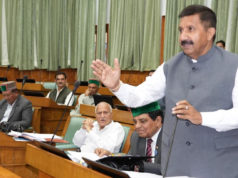In a shocking revelation, the recently presented white paper on the financial situation of Himachal Pradesh has uncovered exorbitant expenses incurred during the previous government’s tenure. Among the startling revelations are the extravagant costs associated with food at Jan Manch events and the exorbitant expenditure on tents for investor meet programs.
During the Assembly session where the white paper was tabled, Deputy Chief Minister Mukesh Agnihotri detailed how the previous government had spent a staggering Rs 6 crore on chapatis (phulkas) at Jan Manch events. This revelation immediately drew widespread attention and criticism, as it suggested a serious misuse of public funds.
Jan Manch events are typically organized to facilitate direct interaction between government officials and the public, making them an important platform for public engagement. However, the revelation of such an extravagant expense for chapatis has raised questions about the financial prudence of the previous administration.
Furthermore, the white paper disclosed that the government had incurred a massive cost of Rs 36 crore for setting up tents during investor meet programs. While such programs are aimed at attracting investments and fostering economic growth, the hefty price tag for tents has raised concerns about fiscal responsibility and the efficient utilization of public resources.
The revelation of these inflated expenses has triggered a debate within the state, with both government officials and the opposition demanding accountability for the allocation and expenditure of public funds. This revelation, coming in the wake of Himachal Pradesh’s growing loan burden and financial crisis, further underscores the need for greater financial transparency and responsibility in the state’s governance.
As the state grapples with its financial challenges, the focus is shifting toward implementing measures to ensure responsible fiscal management and prevent the recurrence of such extravagant expenses in the future. The white paper’s revelations have ignited discussions about the need for stricter financial oversight and accountability mechanisms to safeguard the state’s financial stability.






